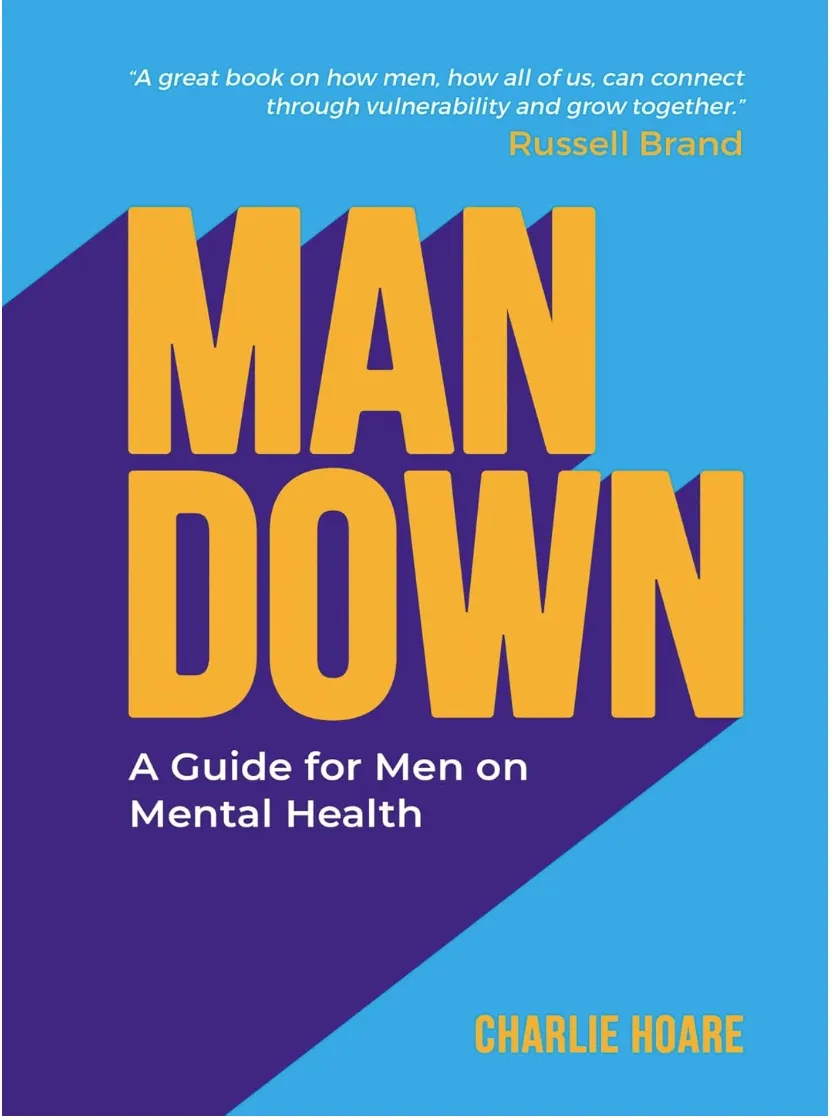Why is Men's Mental Health Still Not Taken Seriously?
Victoria Canham • 31 July 2024 • 8 min read

"The worst thing in life is to end up with people who make you feel all alone." ~ Robin Williams
June was "men's mental health awareness month", so why write about this in July? Well, it's all very well to dedicate an awareness month to the topic but mental ill health doesn't stop as soon as June is over and its impact spills over into work, businesses, personal lives and more. And, if an awareness month was doing enough to support men, then we wouldn't be facing down the barrel of the shocking statistic that 75% of suicides are completed by men or boys and it is the biggest killer of men under 50.
Those numbers increase over holiday periods like Christmas where financial pressure and loneliness can compound.
Before the "what about women" crew turn up, women are statistically more like to attempt suicide but men are more likely to complete. Women also have a higher rate of diagnosis of mental illness, which is not surprising since men won't talk about it, don't seek help and therefore do not get diagnosed. Women are more likely to seek a diagnosis and therefore get help, because the same stigma is not as overwhelming and all-consuming.
It's Just Not That Straightforward
Men's mental health is a complex issue, rooted in societal expectations, personal experiences, and a deep-seated fear of vulnerability. Men are often told to “man up” or “be strong,” as if emotional resilience is a badge of honour, issued by some 'rando' in your wider social circle who knows very little about the real pressures and struggles in your life, to be worn without a scratch. This pressure to conform to outdated stereotypes can be suffocating. It leads many men to suppress their feelings, building a wall around their emotional centres that becomes increasingly difficult to dismantle.
Men suffer in silence because it has not been seen as "manly" to talk about their feelings and struggles, which can leave them feeling isolated and suffering alone, putting up a façade to hide their real self and their struggles, leaving the person they are talking to feeling uncomfortable with the situation, leading to them distancing themselves from the guy needing help.
A Funding Issue?
Men's mental health initiatives have traditionally received less funding than other initiatives because men have not sought support for mental ill health issues for a variety of reasons. Not reporting issues leads to no perceived need for a service and thus, no investment.
It doesn't matter how self-sufficient you are as a man or how resilient and able you are to "sort it out on your own", sometimes that is not enough and more support is needed. Asking for support from local services can directly lead to better investment in mental health services for men.
It is vital that we take men's mental health seriously because it is still heavily stigmatised by people who assume they are not living up to society's expectations of what it means to be a man. You don't have to talk about it publicly, but you do need to ask for support.
Before we move on, I want you to know that no-one else gets to decide what is 'manly' or 'masculine' enough for you.
How Can I Help My Employees?
Mental ill health affects at least 300,000 employees in the UK each year, costing the UK economy in excess of £99 billion per year in lost days and lost productivity. 12.7% of all sick days are related to mental ill health such as stress, depression or anxiety. The most quoted causes of mental health decline in men are work, finances and health.
How you can help:
Monitor employee mental health, make sure you are monitoring their workload, stress levels and general wellbeing.
Implementing well structured wellness programmes and benefits can support this.
Improve communication across the hierarchy of your business or team.
Improve conflict resolution initiatives within your team(s).
Make team wellbeing a management performance indicator.
Remember the whole human when supporting your teams. Schedule regular one-on-one meetings to check in on employees' well-being and offer support.
Provide training for yourself and your team on recognising signs of mental health issues and how to support colleagues.
Ensure employees know about available resources such as Employee Assistance Programs (EAPs), mental health apps, or external support services.
Lead by example and demonstrate the importance of self-care by prioritising your own mental health.
Encourage a healthy work-life balance for yourself and your team.
How Can Society Help?
We can all talk more about our mental health and mental ill health, normalise it and remove the judgement and criticism of people who are enduring a mental illness. Stop treating people who are struggling as if they are contagious and acknowledge the struggle. For those with depression, they are fighting the battle of their lives and it can be terrifying and completely alter their behaviour.
Talking with someone about their mental health and suicidal thoughts has been proven to be more likely to save someone's life and wouldn't you rather talk about their troubles than attend their funeral?
Focus on building strong social circles. When you suspect a man you care about is suffering from mental ill health and he withdraws and starts to isolate himself, show risky behaviours or other changes in behaviour, reach out to him. Do not leave the ball in his court to reach out to you, he won't, his brain is literally lying to him making him believe no-one wants him to burden them. Stop taking "I am fine" as a suitable response, delve deeper.
In general, we need to promote a broader definition of masculinity that includes emotional expression, vulnerability, and seeking help.
How Can I Help Myself?
Cut down on the reliance on substances like alcohol, recreational drugs, food etc, to numb your feelings. 1 in 3 cases of those who complete suicide are under the influence of alcohol, because it is a depressant that lowers your mood the more you consume.
Improve your diet to ensure you are getting the right nutrients in the right amounts.
Move more. You don't need to run 10k every day, taking a walk is a great place to start. Movement releases endorphins which improve your mood.
Practise better sleep hygiene - go to bed at the same time every night, no screens in bed, keep your room cool, change your bedding and pyjamas regularly, wake up at the same time every morning, drink a pint of water on waking.
Spend less time on your phone (especially if you doom scroll) and watching TV/ gaming. Rest your eyes and your brain.
Take Back Control. Taking charge of your mental health is just as important as your physical health.
Talking. There is no weakness, shame in asking for help, in fact it takes huge courage and normalising talking about it paves the way to making it safe for others to ask for help too.
Create work-life balance, more of the same (overworking) is not going to help.
What Not to Do When Supporting Someone About Mental Ill Health
It doesn't help to blame someone for having mental ill health, it is an illness and it is not their fault. They haven't set out to intentionally hurt you and are in a very desperate situation of their own. You wouldn't blame someone for getting cancer, breaking a leg or having a heart attack and just because you can't necessarily see the symptoms, doesn't make mental ill health less of an illness.
Never share any information about someone else's health in the workplace, even if you are just trying to help. Stigma still exists and people have lost their jobs because of mental ill health. It's not your news, don't share it.
In Closing
It is up to all of us to support men to find solutions to mental ill health to prevent more needless deaths. We can all look out for changes in behaviour in the men around us. We can all listen more actively and be more open in our communication with each other. By changing the way we view mental health, we can positively impact the lives of millions of people every year and save thousands of lives.
A Word About Coaching
As a Performance Coach, and a Mental Health First Aider, it would be remiss of me not to talk about coaching here. Coaching won't really help someone who already has suicidal ideations, but it can help turn a life around before it get to depression. Suicidal ideation is a medical emergency, just like a heart attack.
Where to Get Support
Support Resources (UK)
Call your GP and ask for a mental health check, they will usually call you back within 20 minutes
NHS Support 111
Samaritans 116 123
In An Emergency (UK)
Emergency services 999
Samaritans 116 123
Worried About Someone Else
If you believe your person is at immediate risk, you can:
- Call their GP surgery
- Contact Samaritans 116 123
- Call The Campaign Against Living Miserably (CALM) 0800 585858 5pm-midnight
- Call 999 in a emergency
- Take them to A&E and stay with them until they’re seen by a member of the mental health team.
Remember your friend may not want to talk to you about how they are feeling, because it is often easier to talk to a stranger, do not take it to heart.
Recommended Reading
From tips on how to reach out, to advice on navigating mental health issues, this volume is full of guidance on how to look out for your well-being. Topics covered include:
- Anxiety and depression
- Stress
- Suicidal thoughts
- Dealing with traditional gender expectations
- Self-care and mindfulness methods
- How to open up and communicate
- Where to seek help
We’re not just about overcoming obstacles, we’re about transforming lives.
Victoria is an ICF-accredited certified professional coach, who offers bespoke performance coaching. With a background in change management and countless hours of professional coaching training and experience, I made the big switch to full-time coaching in 2020. I know what it is like to suddenly have the rug pulled out from under you while you're busy making other plans, as a result, I now help people like you to bounce back from adversity and major setbacks to emerge stronger and better than ever before. Our clients have transformed from feeling overwhelmed by life's challenges to confident, goal-driven individuals who navigate life's obstacles with ease. They've achieved their personal and professional objectives and embodied peak performance in all aspects of life. You too can experience this transformation. This is your moment. Your chance to take control, to choose growth over stagnation, achievement over inaction. This is your opportunity to prove to yourself that you're not defined by your challenges—you're defined by how you rise above them. Are you ready to transform your life and achieve peak performance?
© Copyright 2026 Victoria Canham Coaching | Website built by Me on FEA Create (aff.)
Performance Coaching Reading, London, Berkshire, Oxford | St George's Road, Reading, Berkshire, United Kingdom, RG30 2RL | +44 7377 527 529 | [email protected] Open Monday to Friday 9 am until 5 pm


Facebook
Instagram
LinkedIn
Youtube
TikTok